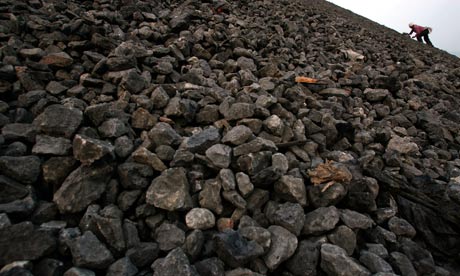Media accuse alleged trafficker of sending workers to factory with no pay, inadequate food and dire living conditions
Tania Branigan in Beijing
14 December 2010

The case in north-west Xinjiang province is the latest in a series of scandals over the exploitation of vulnerable workers.
Eleven labourers, eight with learning disabilities, endured three years of gruelling physical labour with no pay, inadequate food and appalling living conditions, newspaper reports alleged.
Wang Li, 40, from Heilongjiang province, told the Xinjiang Metropolitan newspaper he tried to escape twice but failed and was beaten.
Another worker, Peng Gengui, said: "Normally, if you don't break the rules, you won't be beaten up." He added: "We only get to eat meat when we are too weak to work."
Li Xinlin, owner of the factory in Dazhou city, told the Xinjiang Metropolitan he was employing the workers legally through an agency in south-west Sichuan province.
"Zeng [Lingquan] set up the agency and sends workers across the country to allow those people who can't take care of themselves ... to make a living on their own," he said.
While labourers themselves received nothing, Li also showed a contract stating that the agency was to receive a payment of 9,000 yuan (£850), plus 300 yuan a month for each labourer, with a 1,000 yuan compensation fee if a worker went missing.
Police have been hunting Li, reports added. It was not clear whether the alleged trafficker was in custody.
The newspaper reported that police could not intervene because the factory had a contract with a local authority in Sichuan, whichsaid it had no record of the agency but had sent a team to Xinjiang to investigate.
Other reports alleged Zeng had previously sold people with learning disabilities to a brick factory in Hunan province.
According to Legal Weekly newspaper, police founhd the labourers received no pay and were beaten and given electric shocks for not working fast enough.
A police source said the case was "just the tip of the iceberg".
"Every time this happens, we just feel angry," said Meng Weina, of a Beijing NGO, Hui Ling, which works with people with learning disabilities. "This has been talked about for many years. The government needs to do some concrete work to solve the problems. The police won't look into your case unless you report it, and apparently these people are unable to report to the police."
In 2007, the Chinese government vowed to stamp out the problem after the Shanxi brick kiln case . More than 450 victims – including children as young as 14 – were reportedly kidnapped or tricked into working at the site.
Last year, Chinese media said police had arrested alleged traffickers in Sichuan on suspicion of killing people with learning disabilities in faked mine accidents so they could blackmail bosses into paying compensation.
Geoff Crothall of China Labour Bulletin, in Hongkong, workplaces relying on such labour "if not owned by local officials, have local officials in bed with them".
He added: "These people are very vulnerable to traffickers and even if they are discovered – usually by investigative journalists – the authorities get involved in rescuing people but then just dump them back where they think they came from.
"Often they are very traumatised and have no idea how to adjust back to normal society and they get trafficked again."
Additional research by Lin Yi
14 December 2010
Beijing - Police in south-western China have arrested the manager of a private shelter for the homeless on charges of selling residents, some of whom were mentally disabled, as forced labourers at a remote factory, state media said on Tuesday.
Zeng Lingquan was arrested on Monday for allegedly selling 11 residents of his centre in Quxian county, Sichuan province, to the Jiaersi Green Construction Material Chemical Factory in the far western region of Xinjiang, state media said.
Police began investigating after the Xinjiang Metropolitan News visited the factory to check a report that the factory was using mentally disabled workers.
The factory owner, Li Xinglin, who thought he was being interviewed for a story on pollution, told the newspaper his workers were from the unlicensed centre in Quxian county.
Zeng had opened the centre as a shelter for beggars. It was known locally as a 'disabled self-reliance group' and acted as an 'adoption agency' for physically and mentally disabled people, the official Xinhua news agency quoted officials as saying.
Police were still hunting Li after he fled the factory on Sunday with about 12 of his workers. Li's wife was in police custody, the agency said.
The newspaper said it believed eight of the 11 unpaid workers it met at the factory were mentally disabled.
Police had investigated Zeng in 2007 for suspected human trafficking in connection with the death of a beggar who was sold to a brick kiln in the central province of Hunan, other reports said.
State media have reported several other cases of forced labour since the government promised a crackdown after a scandal in 2007 involving the enslavement and maltreatment of more than 1,000 beggars and mentally disabled people at brick kilns in the northern province of Shanxi.
The Yangtze Evening News last month reported the case of Yuan Hongping, a mentally ill man who was a forced labourer in the south-western province of Yunnan for 12 years until he was freed in October.
In January, Shanghai-based Dragon Television said mentally disabled forced labourers were still working at brick kilns in the central province of Hubei for just 208 yuan (30 dollars) a year.
In a 2008 report on slave labour in China, the Hong Kong-based China Labour Bulletin said 'very little' had changed since the 2007 scandal.
There was 'still a strong demand for forced labour in China, and a well-established and powerful network capable of delivering it,' the report said.
'It seems the government lacks either the political will, or the administrative ability, to control and eradicate the problem of forced labour,' it said.
